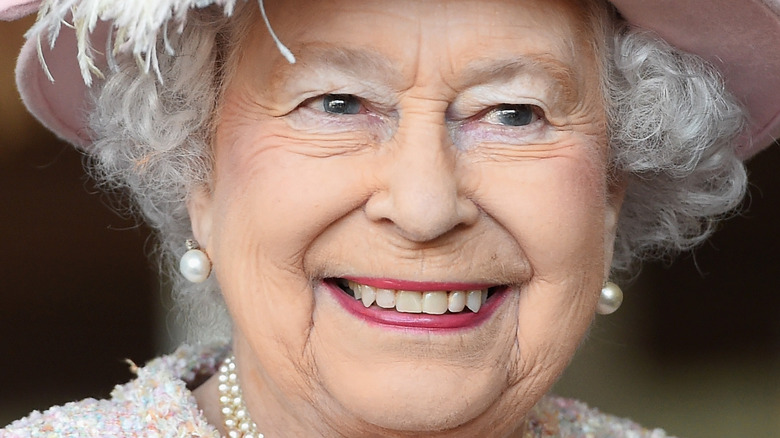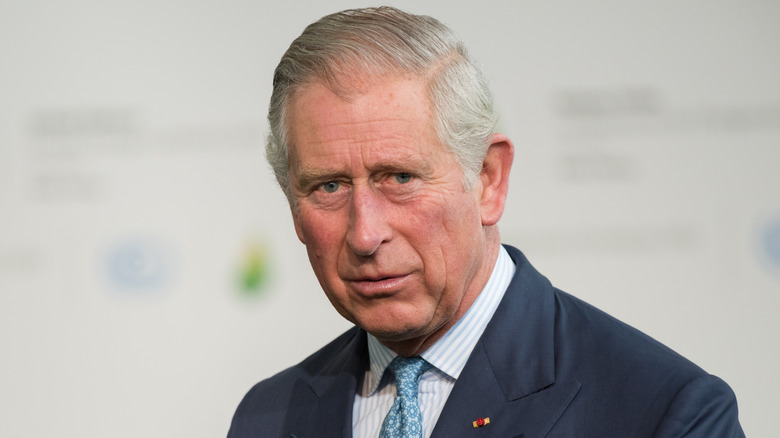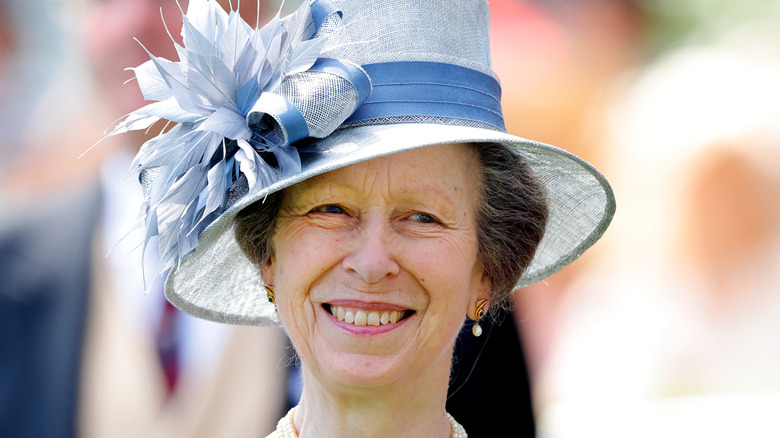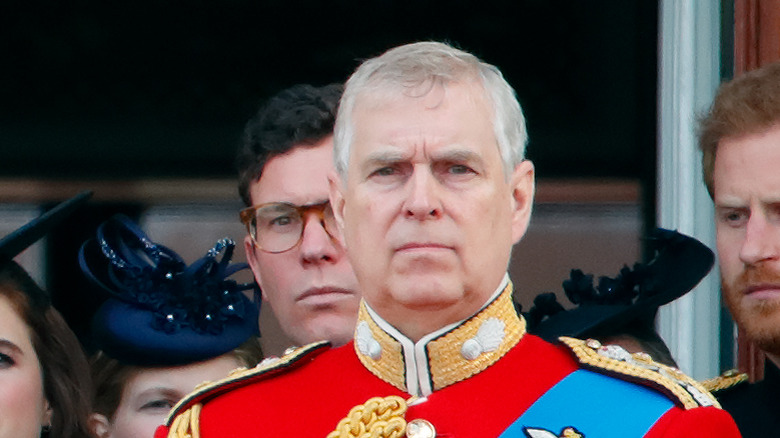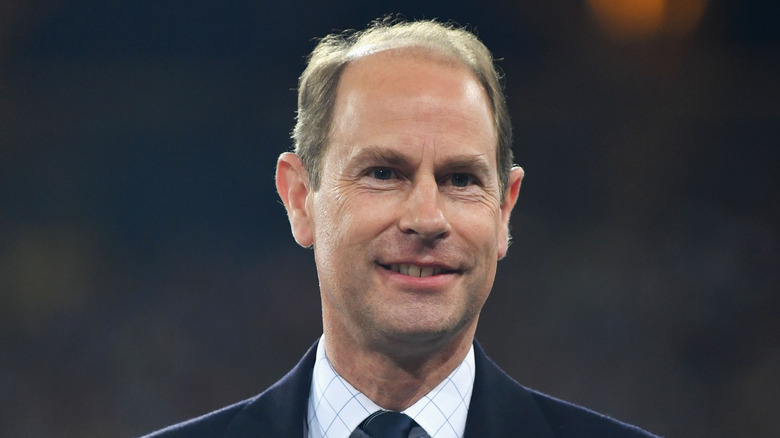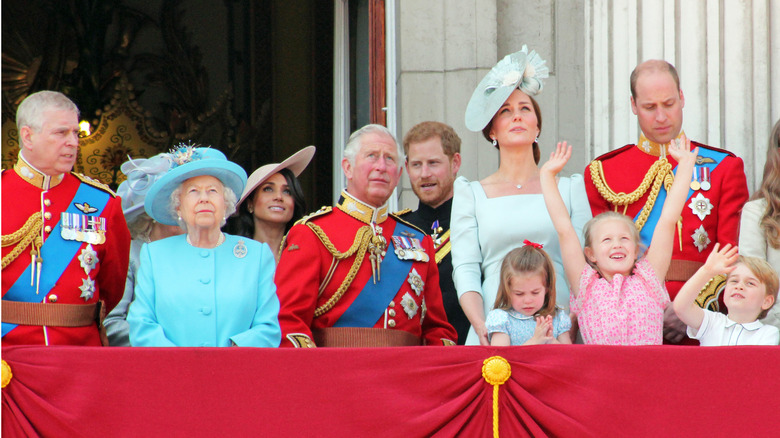These Are The People Queen Elizabeth Named Her Children After
Most people in the Western world have at most three names: their first name, a middle name, and a family name. But when it comes to royalty, a name comes with a lot of history, and isn't as simple as a first, middle, and last name. Even though the average person may not be exposed to the full weight of a royal name on a daily basis, there's a good bit of fascinating history behind the numerous appellations of the world's royalty.
Arguably, no royal family is as famous as the Windsors, who have ruled the kingdom of Great Britain for over 100 years. It was founded by Queen Elizabeth II's grandfather in the midst of World War I to separate the image of the royal family from its original very German name: Saxe-Coburg and Gotha. At the head of that house in the U.K. was Queen Victoria, who was given the sobriquet "grandmother of Europe" due to the number of her descendants who sit on European thrones (via Town & Country).
With such a diverse and expansive family, there's no end of inspiration and obligation when it comes to names in the Windsor family. And, given that each of Queen Elizabeth II's four children has four given names, each child has a not insignificant amount of historical weight on their shoulders (via Marie Claire).
Charles Philip Arthur George
The name Charles has no precedent in the House of Windsor. The last English king with the name Charles was Charles II, who ruled in the 17th century and was disliked for his pro-Catholic sentiments. His father, Charles I, was beheaded and inspired the temporary abolition of the monarchy (via Marie Claire).
Philip is the name of Prince Charles' father, Prince Philip. The name was also passed down to his son, William Arthur Philip Louis. Although Philip isn't a traditional Windsor name, Prince Philip came by his name from Philipp of Hesse-Kassel, a great-grandson of Queen Victoria (via PinkNews).
Arthur is, of course, a historical shout-out to the most famous mythical King of England, but it's also a name that's been tossed about in the family — one of Victoria's sons was named Arthur, and King George VI's full name was Albert Frederick Arthur George Windsor.
The name George is also almost certainly an homage to King George VI, Charles' grandfather, who was king when Charles was born in 1948.
Anne Elizabeth Alice Louise
Anne is another name that didn't exist in the Windsor family until Princess Anne came along. She has passed it along to her daughter Zara Anne Elizabeth. There have, however, been at least three Queen Annes in the past, two were married to kings (James I and James II), and one ruled in her own right (via Royal Central).
The name Elizabeth comes directly from her mother, Elizabeth II, but Elizabeth was also the name of Anne's grandmother, Queen Elizabeth, wife of George VI. And Elizabeth I is one of the most renowned rulers in English history.
Alice is the name of Prince Philip's mother, Princess Alice of Battenberg, who possibly got her name from her grandmother Princess Alice of the United Kingdom, who was the daughter of Queen Victoria.
The name Louise could come from Elizabeth II's great aunt and George V's sister. George V also had an aunt, Louise Caroline Alberta, who was the namesake of the Canadian province. Louise is also the namesake of Anne's younger brother Edward's eldest child, Lady Louise Windsor.
Andrew Albert Christian Edward
Prince Andrew's name is shared with his paternal grandfather, Prince Andrew of Greece and Denmark (via Britroyals). Andrew was also one of the given names of Elizabeth II's uncle, Edward VIII.
Albert is one of the most popular names in the Windsor family. Andrew likely came by it from his grandfather Albert Frederick Arthur George, better known as George VI. He likely got the name from his uncle Prince Albert Victor, who got it from his father, Albert Edward (Edward VII), who got it from the beloved husband of Queen Victoria, Prince Albert (via People).
Christian doesn't have a strong connection to the Windsor family, although it was one of the given names of both Andrew's great uncle Edward VIII and George V's brother Albert Victor. The name could have entered the family via Albert Victor and George V's maternal grandfather, Christian IX of Denmark.
The name Edward might have come from the two previous Windsor kings, Edward VII and Edward VIII (Andrew's great-great-grandfather and great uncle, respectively). Andrew's mother was probably thinking of her uncle Edward VIII when Andrew was born because all of Andrew's given names are also shared by his uncle: Edward Albert Christian George Andrew Patrick David.
Edward Antony Richard Louis
We've already discussed the significance of the name Edward in the House of Windsor, but it goes even further back than that. Queen Victoria probably named her son, Edward VII, after her father, Edward, the brother of King George IV. The name could also come from his mother's cousin, Prince Edward.
There is no precedent for the name Antony in modern British royal history. There is a distant relation from the 16th century named Anthony of Saxony, but it's most likely that the royal family simply liked the name.
Richard is the name of three previous kings of England, all from before the 1500s. The first was an absentee king, and the last lost the throne and ended the House of Plantagenet. The name is possibly inspired by Elizabeth II's cousin, Prince Richard.
The name Louis is probably an homage to Prince Philip's uncle, Louis Mountbatten. Although the name might not have been popular among royals before, that's changing when you consider that Prince William's youngest child was named Louis, and it's also the third given name of his oldest son, Prince George.
Are there rules for all these names?
The naming practices of the royals are governed by tradition more than anything. They're meant to honor and memorialize family members, and the tradition goes at least as far back as Victoria. We already mentioned that she likely named her first born after her father, and her husband, Prince Albert, inspired the names of at least 10 royal children (via The Independent). The tradition continues with Elizabeth II's royal grandchildren as well. Prince William Arthur Philip Louis is named for William the Conqueror, Arthur and Philip are names he shares with his father, and Louis is from his great-great uncle (via Showbiz CheatSheet).
Although the sheer number of first and middle names is overwhelming, the tradition of naming your children after those you love and respect is universal to almost every culture. The only difference between us and the royals in this respect is all of their names are attached to the history books, and for good reason. Royals have to justify their existence and their legitimacy. The plethora of names serves to anchor the family in British history, as names like Richard and Edward harken back to the early kings of England.
